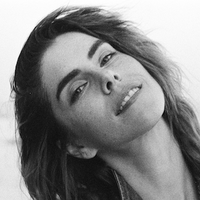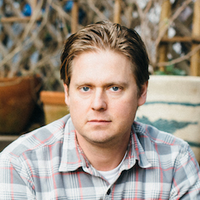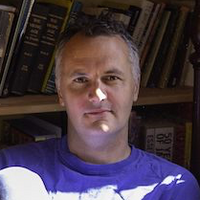As told to Annie Bielski, 2561 words.
Tags: Music, Writing, Inspiration, Creative anxiety, Multi-tasking, Focus.
Musician and writer René Kladzyk on embracing vulnerability
Musician and writer René Kladzyk (aka Ziemba) on writing love songs, the importance of honest human connection, not fearing failure, and being surprised by your own creations.Where are you finding connection right now?
I think the nature of the pandemic really asks you to engage with yourself in what forms of connection you want to cultivate and what you don’t, because our context for operating has been so transformed that we have the opportunity to rewrite our own rules for how we engage with the world. For me, with releasing this album [True Romantic] and just being a creative person, I would say it hasn’t been smooth.
I had a weird nightmare last night related to Instagram. I’ll just tell you about it because it’s actually kind of significant. My dad died seven months ago and since he died, I’ve barely dreamed about him at all and I’ve really wanted to dream about him. I was just thinking about the dream before we started this call. I was like, “Oh god, I’m definitely too in social media, and that’s why I’m having dreams like this.” My sister got off of Instagram and she was one of my favorite parts about Instagram. I miss interacting with her on it. I’m happy for her—everybody should delete Instagram if they feel like it’s going to make their life more full of joy, but my life is a little less full of joy because my sister’s not on Instagram anymore.
In my dream, my sister had set up a private new Instagram account and never told me. It was just for other friends, and I was so upset. I picked up a glass dish and threw it at the floor and shattered it and then went into my room. I was throwing a temper tantrum like a five year old. My dad came in and he was like, “What’s wrong? What’s going on? I was like, “I’m sorry, I’m being a brat.” And he’s like, “It’s okay.” He didn’t judge me. He just wanted me to know that he was there for me. He’s shown up a little in my dreams since he died, but always very distantly. I saw him across the street and I was like, “Oh my god, is that Dad?” But this is the first time I interacted with him and it was just, I don’t know, it was so sweet.
With the pandemic and the way that our lives have been rearranged, it’s a good moment to remember that when it comes to connection, it’s about quality over quantity. I think most social media platforms or parts of the attention economy will tell you the opposite, that you should feel validated and worthy of love or accolades or whatever, if lots of people are trying to connect with you or you’re connecting with lots of people. Ultimately the most validating, fulfilling, joyous forms of connection [are] just not possible to have with that many people, and I wouldn’t want it that way either. It’s kind of like love, where if you didn’t have the pain or the longing in the absence of it, then you wouldn’t maybe value it as much when you have it.
With Covid, I find myself regulating how much social media I use. I can be a glutton for connection because I’m living alone. I just adopted a dog, but I can go days without seeing a human, so I do feel that longing for connection. I remember the day we announced the album, I didn’t see any people in real life. It was funny because I felt kind of celebratory that evening, but I was also by myself and I was just on my phone for so long. It’s not a great feeling. I don’t feel like I’ve figured it out.
What are some feelings or associations you have when you’re in the midst of your creative work?
I try to feel really free. When I’m making stuff, my goal is to not be afraid of failure or to not be attached to an outcome. Because I think—not to be too mystical—a lot of my best work that I’ve made, I don’t really feel like it comes from me. I feel like it comes from me being open to traces floating in the ether that I can tap into and let it pour through me and out of me. It’s that way when I’m writing. It’s that way when I’m arranging and mixing and producing. The goal is for whatever the thing is to take on a life of its own. If I’m making a thing and I have a really clear idea what it should be, that doesn’t empower it to be itself.
My goal is to give whatever I’m making every opportunity to come alive on its own, to be responsive and to try not to project too many expectations in advance onto it, because that can be so limiting. It can be crippling creatively. For me, the worst thing is if I’m starting to work on something and I decide it’s bad, because then how do you move on from there? But if that doesn’t matter, and if you’re not afraid of making a “bad” thing, then you’re liberated to just make things and see what they could become. A lot of the time you have no idea. I think you have to humble yourself before the autonomy of idea, to give it power instead of trying to hold all the power yourself. If you try to hoard that power as the master of ideas it will be to your own demise. Instead of being the master of ideas, you have to be the really nurturing mama.
The idea of ownership over your ideas, or yourself as the creator of them, denies so much. Coding and association plays into what you’re going to make. Try to surrender to yourself as a vessel of a collective consciousness and try to tap into what is the most potent idea that hasn’t yet been given voice and needs to be given voice. That’s more exciting to me. It makes it so strange. This new song, “Harbor Me,” is a really good example of this because I wrote that all at once and I didn’t think it was “good,” or whatever, but I just got into a weird vibe with it. Those lyrics that are in the song are the scratch lyrics and they’re very freely associated. They don’t have a strong, linear, emotional meaning to me, they’re more just an energy to that song. That’s kind of the point of it. That’s part of what’s so fun about it to me, because there’s something about it that feels very foreign and mysterious, because it’s just a thing that I made that came out and then it’s like, “Whoa, what is this thing?” That’s my favorite part of the creative process, when you can be really surprised and also just see this thing that you made, but it’s totally separate from you. It’s not this strategic creation.
You write love songs. What do you think about the relationship between love, longing, and creativity?
For better or worse, I think there is a strong correlation with when I don’t have romantic love in my life and having a higher creative output. I don’t necessarily want to be the advocate of that idea, you know what I mean? It’s just something I’ve definitely observed, that when I feel really fulfilled or satisfied romantically, I tend not to write as much music.
I’m the sort of person who has a number of different creative outlets, but musically, I think a lot of my output has been connected to feelings of romantic love and loneliness and that’s what’s motivated me to create songs on some level. This maybe makes sense because when you write a song you’re often communicating with an invisible audience or a hypothetical audience. Even this album felt very selfish and indulgent in a lot of ways. I wrote the songs just because they felt so satisfying to write songs like this and to try to talk to the canon of pop love songs. There’s songs that are trying to respond to a lot of what I think of as the standards of a pop love song, like the power ballad or the doo wop heartbreak song. I’m trying to play around with what I see as very traditional pop music forms in a way that’s personal and fun and playful.
The bigger question of the connection between love and longing and creativity—I don’t want it to be the case that they are fundamentally linked, that romantic or unfulfilled love or desire is a key part of high creative output. I don’t think it’s the case for everybody, but I do think it has been a lot of the time for me. It definitely was for this album, and that’s fine. It’s something. I wish I was in the middle of a sweeping grand love affair, but I’m not. At least I have this album. I’m living alone and listening to my love songs.
Do you write every day?
No. I’ve been writing for a news website here [in El Paso], so I write every day for them and I have a journal that I write in most days. Music, I write very infrequently and in spurts. When I’m in a music writing frame of mind, I’ll easily write three or five songs in a day. I’ll write a lot, then I’ll go for long periods of not writing songs.
How does your curiosity and work as a journalist inform your work as an artist, and vice versa?
This is a different tangent, but the thing that I find annoying about humans is how much we compartmentalize people and what they can and should do. It’s like it’s too much for us to process. I’d been doing a lot of fragrances with my music before and people were like, “Oh, well this is performance art.” It can just simultaneously be accessible, but I think that’s really hard for people. I don’t think it’s possible for me to know all the ways that the journalism work I do informs my creative work and vice versa. I think they definitely inform each other and are interconnected because it’s just a manifestation of me and my interest and curiosity.
I did my Master’s in Geography, which is a very interdisciplinary academic discipline. I think studying Geography made me less interested in compartmentalizing in general and maybe informed the way I approached playing music, because I’ve always really liked having strong text elements and theatrical [elements]. I like for whatever thing I’m making to exist in multiple forms or have a lot of entry points. I’ve been kind of trying to figure out how to present myself, now that I’m working full time as a journalist. That feels a little weird to me, having been a freelancer for eight years and my primary descriptor was “musician” and now it’s “musician and writer,” “writer and musician.” Those are not the only two words that could describe me, but those are the main two right now.
What is your relationship to vulnerability?
One of my missions for this album was to challenge myself to not hide behind really flowery, poetic language. I think that’s a thing I’ve done a lot. I love flowery poetic language, but when I look back on the songs that I really feel in my heart when I hear them and they give me chills and tingles, it’s when someone is really economical with their language in order to get to the heart of the matter. They’re not shying away from what they’re actually trying to say.
I have had a tendency as a lyricist to find roundabout ways of saying the thing I’m trying to say. That’s a method to avoid being vulnerable, to avoid being seen, and seen in ways that are maybe embarrassing or feel pathetic. My goal with this album was to give myself permission to be fully embarrassing in an effort to not hide from myself, and to be willing to voice feelings that were embarrassing or that were deeply uncomfortable, or even anti-feminist or regressive. I really grappled with that with myself. Why do I feel like I need these kinds of traditional forms of love or romance to have a good life? I felt like I had to grapple with all of the programming of the nuclear family and heteronormative relationships, even to be able to ask those questions. It’s like I had to be willing to sound really lame. My challenge on this album was to not hide behind lyrics, but instead use them as a tool for vulnerability and openness and sometimes I’m more successful than others, in my opinion.
“Casket and Cradle,” I love that song and I’m very proud of it. It has some flowery symbolic language, but it is what it is, it’s fine. There’s another song in the album that’s about my mom that’s called “Mama” that I wrote a really long time ago. It’s the oldest song on the album and I’ve just always been scared to share it because it’s too real and it’s too open. I didn’t want to do that anymore because I felt like, What’s music for except to work through and connect with common human experiences that are difficult? We need music to frame them and process them. That’s one of the reasons we need music. We need music for so many reasons. I really challenged myself to share things that I was scared of sharing in an effort to be vulnerable, open, and honest with myself and to not care too much about the response. So we’re going to see how it goes.
René Kladzyk Recommends:
The book If You Want to Write: A Book About Art, Independence, and Spirit, by Brenda Ueland: This book helped me so much. Even though it’s ostensibly for writers, really it’s incredibly useful for anybody working on a creative project. Be bold, be free, be truthful! Ueland’s lessons and manner of delivering them are so wonderful. Her essay on listening is fantastic, too.
Anicka Yi’s Biography fragrances: I recommend the sample set. All three scents are crazily, stunningly beautiful and extraordinary.
Settlers of Catan: It’s a pandemic! If you aren’t playing board games what are you doing? Stay home! Play a board game. Also if you want to really go for it, my friend Stewart makes wooden relief hand-painted Catan boards.
Listen to This: my friend Jen Monroe’s music blog has turned me on to so many amazing albums, I highly recommend you explore this site if you’re looking for thrilling music to listen to.
Singing! Are you in a bad mood? Singing will definitely help. Are you feeling lonesome? Leave someone an improvised singing voicemail. Have you convinced yourself that you have a “bad” singing voice and therefore shouldn’t sing? Un-convince yourself – singing is such a joyous, open-hearted act, and depriving yourself of it is cruel. Give yourself permission to sing terribly! Give yourself permission to sing ridiculously! Sing alone, sing with friends, sing to your plants, sing to your dog. Do it, sing!




